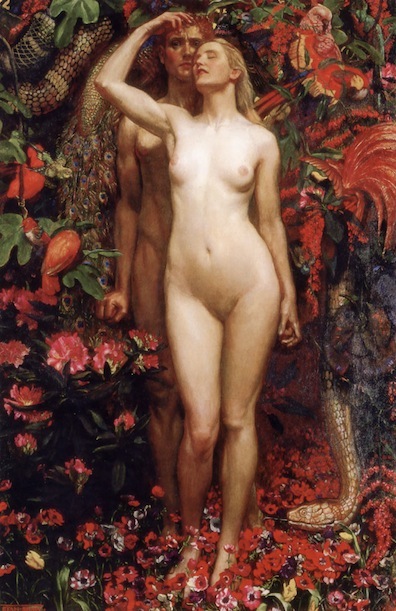Stephen recalls biblical and church teaching about female
sexuality when he thinks in Telemachus of "woman's
unclean loins, of man's flesh made not in God's likeness, the
serpent's prey," and again in Proteus when he thinks
of Eve's "Womb of sin." The loins come from passages in
Leviticus that describe women’s genitals as being “unclean”
during menstruation and childbirth. The other details come
from the creation myth in Genesis.
Leviticus expresses rank revulsion at sexuality, abominating
all the “discharges” of the human body as equivalent to
contagious diseases, and reserving particular horror for the
leaky female vessel. (Chapter 15 makes especially engrossing
reading.) Misogynistic traditions in medieval Christianity,
when Catholic doctrine was being formed, perpetuated these
ancient taboos and joined them with condemnations of Eve.
Stephen’s willingness to repeat these slurs is moderately
appalling: however ignorant of female psychology he may have
been in A Portrait, he was never misogynistic until
now. But he is very much a product of the Irish Catholic
church, the most fiercely body-hating of all European
churches. A Portrait shows his precocious sexual
blooming, his pious attempts to subdue every urge of his
physical nature, and his final choice of sexuality over
religion. But the process is dialectical rather than binary,
and Ulysses finds him seeking sexual happiness with a mind still
full of Catholic habits.
Joyce's own trajectory was not much different. It was not
until he met Nora Barnacle that he began to find his way out
of the Catholic association of female sexuality with sin.
Louis Menand writes, in "Silence, Exile, and Punning" (The
New Yorker, July 2, 2012), that when Nora went out
walking with him on June 16, 1904, and gave him a hand job,
Jim was awestruck." Joyce had known only prostitutes and
proper middle-class girls. Nora was something new, an ordinary
woman who treated him as an ordinary man. The moral simplicity
of what happened between them seems to have stunned him. It
was elemental, a gratuitous act of loving that had not
involved flattery or deceit, and that was unaccompanied by
shame or guilt. That simplicity became the basis of their
relationship."
